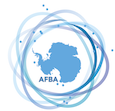 The AFBA Project
The AFBA Project
A Functional Biogeography of the Antarctic is a collaborative project that will provide a comprehensive biodiversity assessment of the region’s terrestrial and intertidal plants and animals. Based on this assessment and advanced genetic and computational techniques, we will deliver a new history of the biology of the region. We will show where different groups have their origins, how different species across the islands are related and connected, and how the life on these islands is related to that of the other southern continents. Importantly, we will seek to understand how frequently different groups have moved between Antarctica and the sub-Antarctic Islands, when this has happened, and the extent to which it continues. Our genetic work will give us insights into the adaptations which enabled life to flourish in these regions. Along the way we will answer questions such as the reasons for such high flightlessness in insects, a long-standing controversy originating with a discussion between Darwin and Hooker.
Importantly, the project outcomes will improve conservation in the  region. First, we will provide a baseline biodiversity surveillance system for the region. This will help conservation managers to identify the species to which newly arrived individuals belong and whether they might pose a threat. Invasive species are the region’s largest conservation problem, and will increase with climate change. Second, our research will inform predictions of the biological consequences of ongoing climate change, so helping to devise ways to mitigate impacts
region. First, we will provide a baseline biodiversity surveillance system for the region. This will help conservation managers to identify the species to which newly arrived individuals belong and whether they might pose a threat. Invasive species are the region’s largest conservation problem, and will increase with climate change. Second, our research will inform predictions of the biological consequences of ongoing climate change, so helping to devise ways to mitigate impacts
The project will leave a substantial legacy:
- Discoveries of species new to science.
- A better understanding of this globally unique region that is precious because of its species and the roles they have played in the history of human understanding.
- Publicly accessible information and products to improve knowledge and appreciation of the sub-Antarctic’s wilderness value, conservation significance, and sheer beauty.
- Education and inspiration of a new cohort of polar scientists and enthusiasts.
Read more about the AFBA team members here
